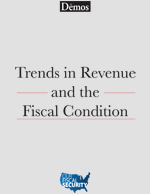Left out of the debate about the U.S. deficit and debt is the role that tax policy has played in reducing the amount of revenue available to fund national needs and plan for our nation’s long-term future As a result of changes to the tax code in the last decade, tax rates in the United States are lower than they have ever been in the country’s history, and far lower than most developed nations. In order to accomplish these goals, our nation will need to replenish its revenue base, which has fallen as a result of changes in tax policy over the last decade, and has been exacerbated by the Great Recession. The government collected less in taxes in 2010 than it has in over three generations, and tax rates are at historic lows.
In order to build a platform for sustained economic growth, our nation must do two things: first, we must ensure a full recovery from the recession, which means getting people back to work, and second, we must plan for longer-term investments which will lay the foundation for sustained growth and a stronger middle class. In order to accomplish these goals, our nation will need to replenish its revenue base, which has fallen as a result of changes in tax policy over the last decade, and has been exacerbated by the Great Recession.
- The government collected less in taxes in 2010 than it has in over three generations, and tax rates are at historic lows.
- The Bush tax cuts added $1.7 trillion to the nation’s debt over 2001-2008, which is more than it would cost to send 24 million kids to four-year public universities.
- Corporate income taxes totaled about 1 percent of GDP this year, 60% lower than 40 years ago.
- General Electric, which reported $5 billion in US profits, paid ZERO taxes this year. Exxon Mobil, the most profitable corporation in history, paid ZERO federal taxes in 2009.
- The Bush tax legacy means we currently tax wealth less than work: middle-income paychecks are taxed at 25% compared to stock dividends and capital gains for the wealthiest, which are taxed at a top rate of only 15%.
- While most small businesses dream of making a killing, only 3 out of every 100small business owners pay taxes at the highest rate.
- A Wall Street transactions tax of only 0.50% on short-term speculation could raise up to $170 billion annually.
- A middle class family with two young children receives on average $1,200 through the federal child care tax credit, yet the cost of their child care averages $18,000.
- Upper income households save an average of $5,500 thanks to the mortgage interest tax deduction.
- Only four OECD nations collect less revenue as a percentage of GDP than the United States: Chile, Korea, Mexico, and Turkey.

